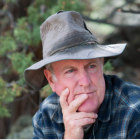On a typical day recycling can be confusing, but in a pandemic it can feel downright discouraging. Evolving health and safety guidelines plus heavy increases in household waste fuel doubts about what’s in, what’s out, and whether it’s possible to safely reduce and reuse. New Canaan recently contracted a new waste management company from Danbury, Oak Ridge Waste and Recycling, further impacting our recycling routine. How is COVID-19 disrupting U.S. waste and recycling? How can I safely reduce and reuse?
Renowned author, professor and researcher, Doug Tallamy, will speak on the topic of his recently published book, “Nature’s Best Hope: A New Approach to Conservation that Starts in Your Yard.” Tallamy is best known for the national conversation he sparked more than a decade ago about the link between healthy ecosystems and human wellbeing. His first book, “Bringing Nature Home”, emphasized the irrefutably significant tie between native plant species, native insects and the rest of the food chain essential for a healthy world. Sponsored by the ten organizations that comprise the New Canaan Pollinator Pathway, Mr. Tallamy’s presentation will offer specific suggestions of how homeowners can turn their properties into conservation corridors and help make a difference for global biodiversity. The event will take place on Tuesday, March 3 at New Canaan Country School Auditorium, 635 Frogtown Road, starting at 7:30 pm (Doors open at 7:00 pm). Tickets are $15.
Of all the ways to protect ourselves against Lyme disease, planting “this” instead of “that” isn’t usually part of the conversation. And yet, knowing which plants attract disease-carrying ticks can make a difference. Japanese barberry, a non-native ornamental shrub that’s popular for its deer resistance, became established on New England’s post-agricultural lands in the early 1900s. It has invaded our forests, stifling native tree and wildflower regeneration and altering soil chemistry. Extensive research has revealed there is a link between Japanese barberry infestations and blacklegged (aka “deer”) ticks and the causal agent of Lyme disease with which they are infected.
In the final year of a life cut tragically short, Anthony Bourdain—celebrity chef, journalist, and globe-trotting host of CNN’s “Parts Unknown”—tackled one of the most shocking and significant problems of our time: food waste. Planet New Canaan will be screening his award-winning and powerful documentary, Wasted! The Story of Food Waste, at New Canaan Library on Monday, June 10 at 6:00 pm. Fully one-third of all food grown in the world is wasted before it reaches our plates. That’s a very big deal, since 80% of the world’s water, 40% of the world’s land, and 10% of the world’s energy goes toward cultivating the food we eat.
Bag It (2010) is a documentary film that invites viewers to make their communities a little less plastic. An estimated 12 million barrels of oil are used annually to make the single use, disposable plastic bags that Americans consume, and once they’re thrown away, they become a major source of pollution. This film documents one man’s quest to figure out where these bags come from, where they go, and how we can use less of them.
